Categories
Change Password!
Reset Password!


WHO has updated its Essential Medicines List to include a range of essential multivitamins and micronutrient supplements for pregnant women, aiming to enhance maternal and fetal health.
In a significant development, the World Health Organization (WHO) has updated its Model List of Essential Medicines, released on 26 July 2023, to encompass a comprehensive range of multivitamins and micronutrient supplements recommended for pregnant women. This update marks a crucial milestone in maternal healthcare and aims to enhance the well-being and health of expectant women and their unborn children.
The newly recommended list of essential medicines for pregnancy includes micronutrient supplements like Vitamins (A, C, D, E, B1, B2, B3, B6, B12), folic acid, iron, iodine, zinc, selenium, and copper for pregnant women (Table 1).

These essential vitamins and minerals are crucial for the healthy development of both the mother and the fetus during pregnancy. Ensuring that pregnant women have access to these vital nutrients can contribute significantly to minimizing the risk of maternal and neonatal complications.
In addition to the multivitamin supplements, the WHO also included two other medicines in the list of essential medicines for pregnancy:
The WHO's comprehensive recommendations underscore the organization's commitment to improving maternal and child health worldwide. Access to these essential medicines and supplements is anticipated to make a significant impact on the well-being of expectant mothers and their infants, ultimately contributing to healthier pregnancies and better maternal outcomes globally.
WHO
WHO Model List of Essential Medicines - 23rd list, 2023
Comments (0)